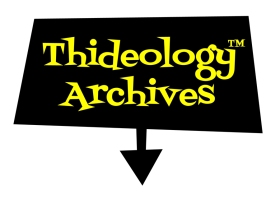Tear down “The Shack”
February 26, 2010 2 Comments
 “The Shack,” the best-selling book that masquerades as Christian literature, is still influencing churches. Unfortunately the message in “The Shack” is contrary to Scripture, and so any influence it has is bound to be counterproductive to legitimate efforts at discipleship.
“The Shack,” the best-selling book that masquerades as Christian literature, is still influencing churches. Unfortunately the message in “The Shack” is contrary to Scripture, and so any influence it has is bound to be counterproductive to legitimate efforts at discipleship.
Here is a short list of out-and-out heresies contained in this horrid piece of writing. And here is a review of the book where you may listen to an interview with the author where the author actually denies the substitutionary atonement of Christ (a pretty important biblical doctrine).
That a book so blatantly contrary to Scripture could have this big an impact on the Church is evidence that many of us haven’t been taught how to study Scripture — or that we don’t care to study Scripture.
UPDATED INFORMATION
Since originally posting the information above, I’ve received a few e-mails asking for a full review of “The Shack.” I seriously doubt I will write a full review, but I will offer the following:
I first became aware of “The Shack” through a friend. He called and asked me if I had an opinion on it. I told him I’d never heard of it but would check it out. That afternoon I went to a bookstore on my lunch break and sat down and skimmed through the book. After about an hour I had read enough to convince me of the dangers contained in this book. Here is a summary of the notes I took:
- The Bible is portrayed as an insufficient revelation to man and it is only in his discussion with “God” in the shack that the main character begins to have even a basic understanding of the character of God.
- What the “God” in the shack says to the main character is to be considered superior to Scripture. This is a blatant endorsement of progressive revelation — which is a hallmark of cults. Furthermore, were God to audibly speak to any of us we could rest assured his words would NOT contradict Scripture.
- “Jesus” is stated to be “truly human.” When the main character asks about Jesus performing miracles — which seems to be an act of the divine — “God” tells the main character that Jesus had no power in and of himself to perform miracles. It was only in his relationship with “God” that Jesus did those things. A clear implication is made that we could have the same ability if only we would follow the example of “Jesus” and establish that same kind of relationship.
- “God” explains to the main character that he/she submits to man. This, “God” explains, is the same kind of submission the trinity makes with itself and invites man to join.
- A clear implication toward universalism is made. According to the book, Jesus’ death saved everyone but only a few choose a relationship.
Bottom Line: There are clear theological statements made concerning the nature and character of God that are contradictory to Scripture. These are not “minor” issues that can be overlooked in order to “get the main idea” the author is trying to convey. The main idea of the book is based on these erroneous notions of God. If we allow ourselves to accept (even briefly) unbiblical characteristics about God then we are in danger of worshipping a God of our own making. When we do this we end up worshipping a false God — regardless of whether or not we still use the same names for him. Remember, there are cults who claim to worship Jesus, too. But their “Jesus” bears no resemblance to the Jesus in Scripture. Theirs is a false God. Now, the “God” of “The Shack” can be added to the list.






